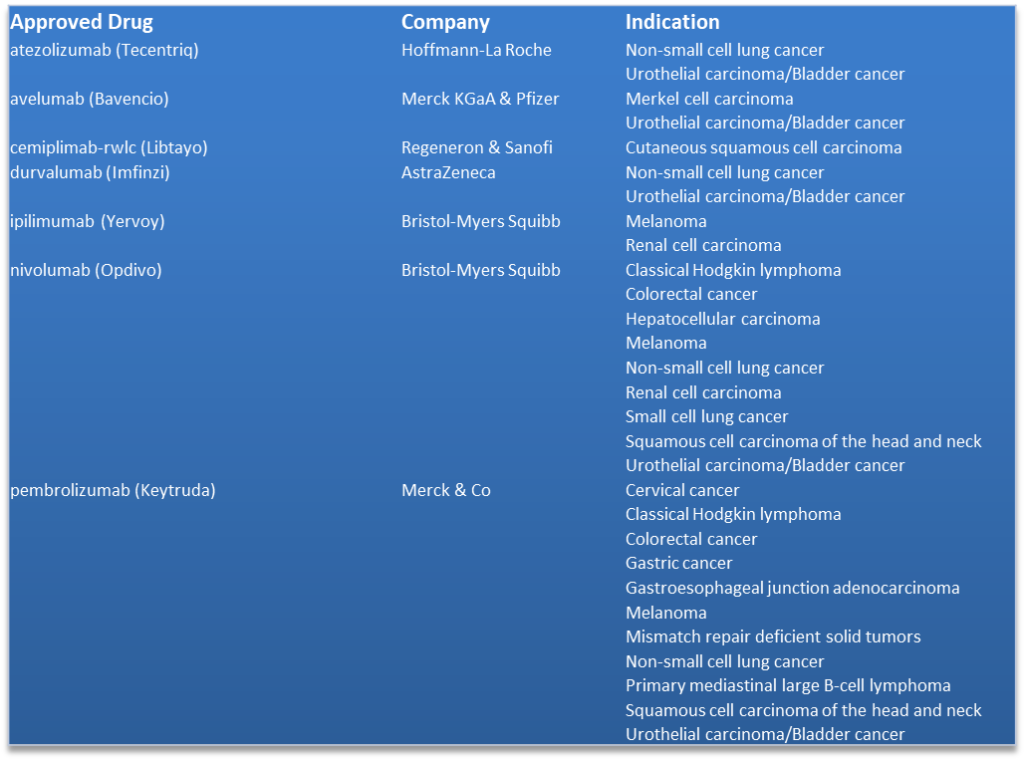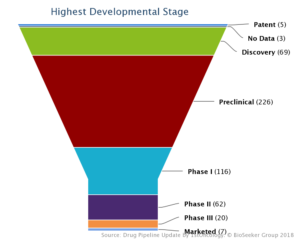On October 1, 2018 Amgen (NASDAQ:AMGN) reported that the U.S. Food and Drug Administration (FDA) has approved the supplemental New Drug Application (sNDA) to expand the Prescribing Information for KYPROLIS (carfilzomib) to include a once-weekly dosing option in combination with dexamethasone (once-weekly Kd70) for patients with relapsed or refractory multiple myeloma (Press release, Amgen, OCT 1, 2018, View Source;p=RssLanding&cat=news&id=2369600 [SID1234529745]). The approval is based on data from the Phase 3 A.R.R.O.W. trial, which demonstrated that KYPROLIS administered once-weekly at 70 mg/m2 with dexamethasone achieved superior progression-free survival (PFS) and overall response rates (ORR), with a comparable safety profile, versus twice-weekly KYPROLIS administered at a dose of 27 mg/m2 in combination with dexamethasone (twice-weekly Kd27). KYPROLIS is not approved for twice-weekly 27 mg/m2 administration in combination with dexamethasone alone.
Schedule your 30 min Free 1stOncology Demo!
Discover why more than 1,500 members use 1stOncology™ to excel in:
Early/Late Stage Pipeline Development - Target Scouting - Clinical Biomarkers - Indication Selection & Expansion - BD&L Contacts - Conference Reports - Combinatorial Drug Settings - Companion Diagnostics - Drug Repositioning - First-in-class Analysis - Competitive Analysis - Deals & Licensing
Schedule Your 30 min Free Demo!
"In the fight against multiple myeloma, we are committed to continued evidence generation and innovation to serve patients. KYPROLIS now offers patients with relapsed or refractory multiple myeloma the option of a more convenient dosing regimen that provides better outcomes with a comparable safety profile," said David M. Reese, M.D., executive vice president of Research and Development at Amgen. "We’re pleased that the FDA has recognized the importance of bringing more treatment options to cancer patients more quickly through its pilot programs and proud to participate with this KYPROLIS data."
The FDA reviewed the application under its Oncology Center of Excellence Real-Time Oncology Review and Assessment Aid pilot programs, which aim to explore a more efficient review process to ensure that safe and effective treatments are available to patients as early as possible. The FDA approved the application in just over one month after the final component of the application was submitted.
"While great progress has been made in the last decade, multiple myeloma remains an incurable disease characterized by a recurring pattern of remission and relapse, and it is important that patients have treatment options that meet their individual needs," said David S. Siegel, M.D., Ph.D., chief of the Division of Multiple Myeloma at John Theurer Cancer Center at Hackensack University Medical Center. "The availability of a more convenient once-weekly dosing regimen, with superior efficacy, comparable safety, and longer duration of therapy versus the twice-weekly regimen studied in the trial could allow patients to spend more time outside of the infusion center."
A.R.R.O.W. included 478 patients with relapsed and refractory multiple myeloma who received at least two or three prior lines of therapy, including a proteasome inhibitor and an immunomodulatory agent. Patients in the trial treated with once-weekly Kd70 achieved a statistically significant 3.7 month improvement in PFS compared to the Kd27 twice-weekly regimen (median PFS 11.2 months for once-weekly Kd70 versus 7.6 months for twice-weekly Kd27; HR=0.69; 95 percent CI: 0.54-0.88; one-sided p=0.0014).The ORR in patients treated with once-weekly Kd70 was 62.9 percent versus 40.8 percent for those treated with twice-weekly Kd27 (p<0.0001). In addition, 7.1 percent had complete responses or better in the once-weekly arm versus 1.7 percent in the twice-weekly arm in this refractory patient population.
The overall safety profiles of the two arms in A.R.R.O.W. were comparable, with no new safety risks identified in the once-weekly arm. Discontinuation rates due to adverse events were similar in the two arms. The most frequently reported treatment-emergent adverse events (greater than or equal to 20 percent) in either treatment arm were anemia, diarrhea, fatigue, hypertension, insomnia and pyrexia.
The interim data were presented during an oral session at the 54th Annual Meeting of the American Society of Clinical Oncology (ASCO) (Free ASCO Whitepaper) and simultaneously published in The Lancet Oncology.
About A.R.R.O.W.
The A.R.R.O.W. (RAndomized, Open-label, Phase 3 Study in Subjects with Relapsed and Refractory Multiple Myeloma Receiving Carfilzomib in Combination with Dexamethasone, Comparing Once-Weekly versus Twice-weekly Carfilzomib Dosing) trial evaluated 478 patients with relapsed and refractory multiple myeloma who have received at least two but no more than three prior therapies, including bortezomib and an immunomodulatory drug. Those included in the study were randomized to receive a 30-minute infusion of once-weekly KYPROLIS (20 mg/m2 on day 1 of cycle 1; 70 mg/m2 on days 8 and 15 of cycle 1; and 70 mg/m2 on days 1, 8 and 15 of subsequent cycles) with dexamethasone (40 mg) versus a 10-minute infusion of twice-weekly KYPROLIS (20 mg/m2 on days 1 and 2 of cycle 1; 27 mg/m2 on days 8, 9, 15 and 16 of cycle 1; and 27 mg/m2 on days 1, 2, 8, 9, 15 and 16 of subsequent cycles) with dexamethasone (40 mg). The primary endpoint of the trial was PFS, defined as the time from randomization to disease progression or death. Secondary endpoints included ORR, overall survival, and safety and tolerability.
The trial was conducted in approximately 100 sites worldwide. For more information about this trial, please visit www.clinicaltrials.gov under trial identification number NCT02412878.
About Multiple Myeloma
Multiple myeloma is an incurable blood cancer, characterized by a recurring pattern of remission and relapse.1 It is a rare and life-threatening disease that accounts for approximately one percent of all cancers.2,3 Worldwide, approximately 114,000 people are diagnosed with multiple myeloma each year and 80,000 patient deaths are reported on an annual basis.2
About KYPROLIS (carfilzomib)
Proteasomes play an important role in cell function and growth by breaking down proteins that are damaged or no longer needed.4 KYPROLIS has been shown to block proteasomes, leading to an excessive build-up of proteins within cells.5 In some cells, KYPROLIS can cause cell death, especially in myeloma cells because they are more likely to contain a higher amount of abnormal proteins.4,5
Since its first approval in 2012, approximately 80,000 patients worldwide have received KYPROLIS. KYPROLIS is approved in the U.S. for the following:
In combination with dexamethasone or with lenalidomide plus dexamethasone for the treatment of patients with relapsed or refractory multiple myeloma who have received one to three lines of therapy.
As a single agent for the treatment of patients with relapsed or refractory multiple myeloma who have received one or more lines of therapy.
KYPROLIS is also approved in Argentina, Australia, Bahrain, Canada, Hong Kong, Israel, Japan, Kuwait, Lebanon, Macao, Mexico, Thailand, Colombia, S. Korea, Canada, Qatar, Switzerland, United Arab Emirates, Turkey, Russia, Brazil, India, Oman and additional U.S. regulatory applications for KYPROLIS are underway and have been submitted to health authorities worldwide.
Important U.S. KYPROLIS (carfilzomib) Safety Information
Cardiac Toxicities
New onset or worsening of pre-existing cardiac failure (e.g., congestive heart failure, pulmonary edema, decreased ejection fraction), restrictive cardiomyopathy, myocardial ischemia, and myocardial infarction including fatalities have occurred following administration of KYPROLIS. Some events occurred in patients with normal baseline ventricular function. Death due to cardiac arrest has occurred within one day of administration.
Monitor patients for signs or symptoms of cardiac failure or ischemia. Evaluate promptly if cardiac toxicity is suspected. Withhold KYPROLIS for Grade 3 or 4 cardiac adverse events until recovery, and consider whether to restart at 1 dose level reduction based on a benefit/risk assessment.
While adequate hydration is required prior to each dose in Cycle 1, monitor all patients for evidence of volume overload, especially patients at risk for cardiac failure. Adjust total fluid intake as clinically appropriate.
For patients ≥ 75 years, the risk of cardiac failure is increased. Patients with New York Heart Association Class III and IV heart failure, recent myocardial infarction, conduction abnormalities, angina, or arrhythmias may be at greater risk for cardiac complications and should have a comprehensive medical assessment prior to starting treatment with KYPROLIS and remain under close follow-up with fluid management.
Acute Renal Failure
Cases of acute renal failure, including some fatal renal failure events, and renal insufficiency adverse events (including renal failure) have occurred. Acute renal failure was reported more frequently in patients with advanced relapsed and refractory multiple myeloma who received KYPROLIS monotherapy. Monitor renal function with regular measurement of the serum creatinine and/or estimated creatinine clearance. Reduce or withhold dose as appropriate.
Tumor Lysis Syndrome
Cases of Tumor Lysis Syndrome (TLS), including fatal outcomes, have occurred. Patients with a high tumor burden should be considered at greater risk for TLS. Adequate hydration is required prior to each dose in Cycle 1, and in subsequent cycles as needed. Consider uric acid lowering drugs in patients at risk for TLS. Monitor for evidence of TLS during treatment and manage promptly, and withhold until resolved.
Pulmonary Toxicity
Acute Respiratory Distress Syndrome (ARDS), acute respiratory failure, and acute diffuse infiltrative pulmonary disease such as pneumonitis and interstitial lung disease have occurred. Some events have been fatal. In the event of drug‐induced pulmonary toxicity, discontinue KYPROLIS.
Pulmonary Hypertension
Pulmonary arterial hypertension (PAH) was reported. Evaluate with cardiac imaging and/or other tests as indicated. Withhold KYPROLIS for PAH until resolved or returned to baseline and consider whether to restart based on a benefit/risk assessment.
Dyspnea
Dyspnea was reported in patients treated with KYPROLIS. Evaluate dyspnea to exclude cardiopulmonary conditions including cardiac failure and pulmonary syndromes. Stop KYPROLIS for Grade 3 or 4 dyspnea until resolved or returned to baseline. Consider whether to restart based on a benefit/risk assessment.
Hypertension
Hypertension, including hypertensive crisis and hypertensive emergency, has been observed, some fatal. Control hypertension prior to starting KYPROLIS. Monitor blood pressure regularly in all patients. If hypertension cannot be adequately controlled, withhold KYPROLIS and evaluate. Consider whether to restart based on a benefit/risk assessment.
Venous Thrombosis
Venous thromboembolic events (including deep venous thrombosis and pulmonary embolism) have been observed. Thromboprophylaxis is recommended for patients being treated with the combination of KYPROLIS with dexamethasone or with lenalidomide plus dexamethasone. The thromboprophylaxis regimen should be based on an assessment of the patient’s underlying risks.
Patients using hormonal contraception associated with a risk of thrombosis should consider an alternative method of effective contraception during treatment.
Infusion Reactions
Infusion reactions, including life‐threatening reactions, have occurred. Symptoms include fever, chills, arthralgia, myalgia, facial flushing, facial edema, vomiting, weakness, shortness of breath, hypotension, syncope, chest tightness, or angina. These reactions can occur immediately following or up to 24 hours after administration. Premedicate with dexamethasone to reduce the incidence and severity of infusion reactions. Inform patients of the risk and of symptoms and seek immediate medical attention if they occur.
Hemorrhage
Fatal or serious cases of hemorrhage have been reported. Hemorrhagic events have included gastrointestinal, pulmonary, and intracranial hemorrhage and epistaxis. Promptly evaluate signs and symptoms of blood loss. Reduce or withhold dose as appropriate.
Thrombocytopenia
KYPROLIS causes thrombocytopenia with recovery to baseline platelet count usually by the start of the next cycle. Monitor platelet counts frequently during treatment. Reduce or withhold dose as appropriate.
Hepatic Toxicity and Hepatic Failure
Cases of hepatic failure, including fatal cases, have occurred. KYPROLIS can cause increased serum transaminases. Monitor liver enzymes regularly regardless of baseline values. Reduce or withhold dose as appropriate.
Thrombotic Microangiopathy
Cases of thrombotic microangiopathy, including thrombotic thrombocytopenic purpura/hemolytic uremic syndrome (TTP/HUS), including fatal outcome have occurred. Monitor for signs and symptoms of TTP/HUS. Discontinue if diagnosis is suspected. If the diagnosis of TTP/HUS is excluded, KYPROLIS may be restarted. The safety of reinitiating KYPROLIS is not known.
Posterior Reversible Encephalopathy Syndrome (PRES)
Cases of PRES have occurred in patients receiving KYPROLIS. If PRES is suspected, discontinue and evaluate with appropriate imaging. The safety of reinitiating KYPROLIS is not known.
Increased Fatal and Serious Toxicities in Combination with Melphalan and Prednisone in Newly Diagnosed Transplant-ineligible Patients
In a clinical trial of transplant-ineligible patients with newly diagnosed multiple myeloma comparing KYPROLIS, melphalan, and prednisone (KMP) vs bortezomib, melphalan, and prednisone (VMP), a higher incidence of serious and fatal adverse events was observed in patients in the KMP arm. KMP is not indicated for transplant-ineligible patients with newly diagnosed multiple myeloma.
Embryo-fetal Toxicity
KYPROLIS can cause fetal harm when administered to a pregnant woman.
Females of reproductive potential should be advised to avoid becoming pregnant while being treated with KYPROLIS and for 6 months following the final dose. Males of reproductive potential should be advised to avoid fathering a child while being treated with KYPROLIS and for 3 months following the final dose. If this drug is used during pregnancy, or if pregnancy occurs while taking this drug, the patient should be apprised of the potential hazard to the fetus.
ADVERSE REACTIONS
The most common adverse reactions in the combination therapy trials: anemia, neutropenia, diarrhea, dyspnea, fatigue, thrombocytopenia, pyrexia, insomnia, muscle spasm, cough, upper respiratory tract infection, hypokalemia.


